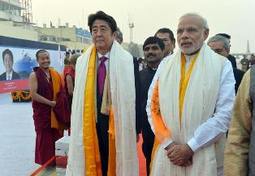 Source: indianexpress.com
Source: indianexpress.com The development of the India-Japan relationship in many ways resembles that of Australia’s relations with Japan, except in the case of India there is a much larger potential benefit to Japan in forging closer ties to the Indo-Pacific’s most populous democracy. While both countries have broadened their relationship as a counterweight to China’s influence on the region, the sheer scale of India’s infrastructure needs, coupled with its promise of a broad middle class, provide Japan with another avenue into which to pour its expertise and thus invigorate sluggish domestic Japanese industries.
For most of this year, Abe was assured by the presence in India and Australia of two like-minded conservative leaders who shared his concerns regarding China and wished to see Japan play a more pro-active role in the region. The Australian end of this relationship was temporarily thrown into doubt following the removal of Tony Abbott, yet all indications are that Malcolm Turnbull will place as much emphasis on the importance of solid relations with Japan both as a security measure and as a potential market to inspire Australian innovation.
To that end, next week Mr Turnbull will be making his way to Tokyo for talks with PM Abe ($). Clearly the main topic of discussion will involve Australia’s Future Submarine Project and Australia’s intentions regarding this, but there will be plenty of other topics at hand, including the South China Sea, the Japan-Australia Economic Partnership Agreement, Japanese investment in Australia, and the potential for more joint exercises between the ADF and the SDF (not forgetting the contentious topic of whaling). To be honest, the timing of the visit is a bit of a surprise, coming smack bang in the middle of the Christmas season which means that only foreign policy tragics and journalists will be paying attention to it.
Given the promise made last year to have an annual leaders’ meeting between Australia and Japan, there certainly was a pressing need for a bilateral dialogue to occur before years’ end. However given that Turnbull met with Abe at the G20 and again at the EAS, one could be forgiven for thinking that both leaders had already made their views known to each other and that they would be content to leave it at that. But Turnbull knows that a healthy relationship with Japan depends on his personal rapport with PM Abe and that there is a need to provide a reassurance to Japan that relations haven’t changed. So despite the late scheduling, Turnbull will find himself in Tokyo talking to a leader very much focused on broadening Japan’s relationship with Australia in whatever capacity possible.
Hence expectations are that this will be a successful, if somewhat more low key bilateral visit to Japan. Next year of course Abe will have to return the compliment, and given that it is an election year in Australia, coupled with a pending decision on the future submarine project, 2016 promises to be a very interesting period of time in the bilateral relationship, and the outcome of all of those events will dictate the trajectory of bilateral ties for more than a decade to come.
 RSS Feed
RSS Feed